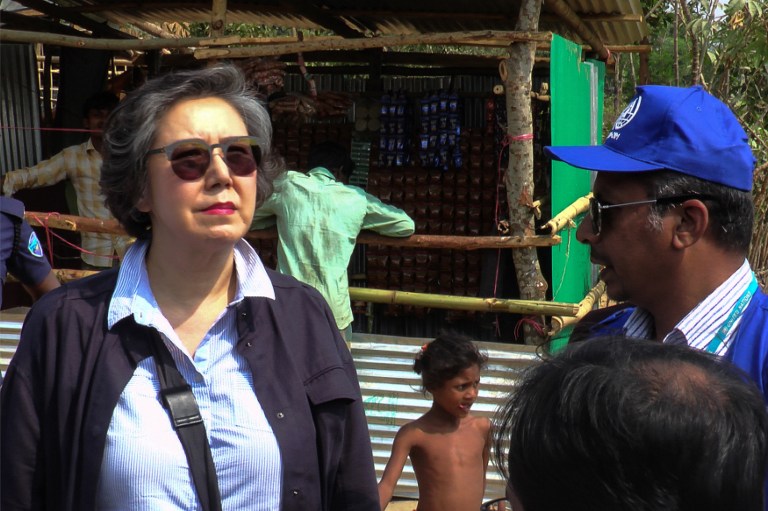The UN special rapporteur on human rights in Burma arrives in Bangladesh on Thursday, vowing to fulfill her mandate despite being blacklisted by the Burmese government from continuing her work in the country that is her focus.
“I will not be deterred,” the rights envoy, Yanghee Lee, said in a statement on Tuesday before leaving on the 13-day trip, which will include a visit to Thailand.
“By not giving me access to Myanmar and by refusing to cooperate with the mandate, my task is made that much more difficult, but I will continue to obtain first-hand accounts from victims and witnesses of human rights violations by all means possible, including by visiting neighbouring countries where some have fled,” she said.
Both Bangladesh and Thailand host large populations of Burmese refugees, but it is along the Burma-Bangladesh border that an unfolding humanitarian crisis has attracted global attention.
While in Bangladesh, Lee will visit camps housing some of the hundreds of thousands of Rohingya who have fled Burma’s Rakhine State since late August, when attacks by Rohingya Muslim insurgents unleashed a fierce counter-insurgency campaign that the UN has described as ethnic cleansing.
More than 650,000 Rohingya have sought refuge in Bangladesh since the 25 August insurgent attacks and subsequent crackdown by Burmese security forces.
The relationship between Lee and the Burmese government — while always inherently tense due to the nature of her mandate — appears to have frayed past the point of repair since August, and last month she revealed that she had been barred from returning to the country. International criticism of Burma’s handling of the unrest in Rakhine State has led the government to increasingly adopt a bunker mentality, alarming human rights advocates, imperiling prospects for foreign investment and tarnishing the reputation of de facto leader and Nobel laureate Aung San Suu Kyi.
The country’s powerful military has not been immune to the repercussions of the alleged misconduct by security forces under its control. Several Western nations have dramatically scaled back military-to-military ties with the Tatmadaw, and in December the United States slapped sanctions on Major-General Maung Maung Soe, who led the initial counter-insurgency operations in Rakhine State but was subsequently replaced.
In justifying its decision to blacklist Lee, a spokesperson for Burma’s Ministry of Foreign Affairs told Reuters last month that she lacked “impartiality and objectivity.”
[related]
“The Government has accused me of bias, while at the same time denying that human rights violations have taken place in Myanmar,” Lee said in Tuesday’s statement. “I would ask the authorities to rethink their position, and to put the victims first.”
The government and military have vociferously denied that any widespread or systematic human rights abuses have been perpetrated against the Rohingya, though last week brought a rare admission from the Tatmadaw that security forces were responsible for killing 10 members of the Muslim minority discovered in a shallow grave last month.
Lee, who last visited Burma in July of last year, was appointed to her post in 2014. She is due to deliver a report on the findings of her visits this month to the UN Human Rights Council in March.



